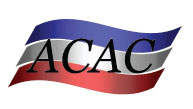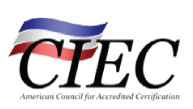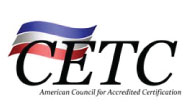Indoor Air Quality Certifications
Clean Air Sciences, Inc.’s Environmental Scientist is a Certified Indoor Environmental Consultant (CIEC) as of March 2007, and Certified Environmental Thermography Consultant (CETC) as of April 2011. These are the highest indoor air quality and infrared thermal imaging certifications held by the American Council for Accredited Certification. Our certifications are due for renewal in the Spring every 2 years. Please click on the links for the ACAC (CIEC, CETC, and ACAC images at the bottom of all our pages) to look us up to verify they are current using our company name in the search field for insured companies. We challenge you to look up any other company or person you may consider hiring.
ACAC
The American Council for Accredited Certification (ACAC) develops and maintains independent, third-party accredited certification programs for professionals. ACAC certifications attest to verified knowledge, field experience and continuing professional development.
The CIEC and CETC certifications are accredited by the Council for Engineering and Scientific Specialty Boards (CESB), a nationally recognized independent accreditation body. The CIEC program is also accredited by the National Commission for Certifying Agencies (NCCA). ACAC examinations are compliant with standards published by APA, AERA and NCME. ACAC is a member of the Institute for Credentialing Excellence (ICE), formerly known as NOCA.
What is a CIEC?
A Council-certified Indoor Environmental Consultant (CIEC) has earned the most respected certification in the field of indoor environmental consulting.
A CIEC investigates indoor air quality problems. For example, a CIEC can identify mold and moisture issues during a commercial investigation or a home inspection. A CIEC has verified knowledge of three or more disciplines related to indoor air quality, including HVAC, building science, microbial issues, industrial hygiene, lead-based paint and asbestos.
Each CIEC has demonstrated at least eight (8) years experience conducting field investigations in one or more of the following settings:
- Offices and commercial buildings
- Industrial structures
- Government facilities
- Schools and public buildings
- Healthcare facilities
- Home inspection
To earn and maintain the CIEC, every candidate must:
- Demonstrate at least eight (8) years of verifiable field experience in IAQ consulting
- Pass a rigorous, psychometrically rated examination based on broad industry knowledge rather than a course curriculum
- Earn the unanimous approval of the CIEC certification board
- Recertify every two years
- Participate in 20 hours of professional development activities each year
- Maintain the highest ethical standards
Why Certifications through the ACAC are so important to States and Licensing Programs.
If you live in one of the 13 states, (AK, CA, FL, KY, LA, ME, MD, NH, NJ, NY, OK, TX, VA) and Wash. D.C., that have adopted ACAC certifications for their state-licensing program for mold inspectors you have at least a good starting point. These state licenses are granted for the entry-level ACAC mold inspector credentials of CSMI (no experience), and CMI (2 years exp.), and the CMC (8 years exp.). All of these credentials are superseded by the CIEC which is the top indoor air quality certification encompassing mold and several other areas of expertise in IAQ.
Illinois State Mold Inspector License – None Exists Yet
If you live in Illinois as I do you are aware of the very slow rate at which legislation proceeds and my bet is that an Illinois mold inspector license will occur after all the other states have adopted one, so we may be a few decades away from an IL-licensed mold inspector. When that occurs, Clean Air Sciences, Inc.’s CIEC will be grandfathered into the license program (our CIEC scientist may literally be a grandfather by then). Illinois would need to adopt the ACAC certifications to have an Illinois mold inspector certification and/or Illinois mold inspector license similar to the other 13 states with current mold inspector licenses. Until then, we can continue to rely on the ACAC to provide credentialed individuals and companies for certified mold inspectors, certified mold consultants, and certified indoor environmental consultants (CIEC).
What is a CETC?
A Council-certified Environmental Thermography Consultant (CETC) investigates structural and environmental issues in the built environment using infrared thermography. For example, a CETC can identify mold and moisture issues during a commercial investigation or a home inspection that may be invisible to the naked eye. A CETC has verified knowledge of thermal and infrared physics as they apply to the building sciences. A CETC has verified knowledge of the selection, calibration and operation of thermal imaging equipment. Finally, a CETC knows how to apply the principles and equipment of infrared thermography to a building investigation.
Each CETC has demonstrated at least eight (8) years experience conducting field investigations involving infrared thermography. Field experience documentation is reviewed by the CETC certification board.
To earn the Council-certified Environmental Thermography Consultant (CETC) designation, every candidate must:
- Demonstrate at least eight (8) years of verifiable field experience in environmental thermography
- Pass a rigorous examination based on broad industry knowledge rather than a course curriculum
- Earn the unanimous approval of the CETC certification board
- Re-certify every two years
- Participate in 20 hours of professional development activities each year
- Maintain the highest ethical standards
Organizations and agencies that require, recommend, or recognize ACAC certifications include:
• USEPA • NASA • The American Lung Association • CDC • FEMA • HUD • NIH • HHS • US Army Corps of Engineers • US Naval Facilities Engineering Command • US Air Force Civil Engineer Center • State of New Hampshire • State of Connecticut • State of Georgia • State of Florida • State of Arkansas • State of Mississippi • State of New Mexico • State of Maryland • State of New York • Montgomery County, MD • Craven County, NC • National Institute of Building Sciences • National Environmental Health Association • National Center for Healthy Housing • Cornell University • Louisiana State University



